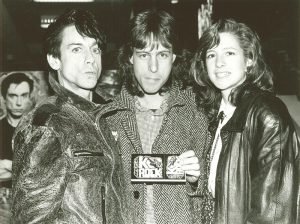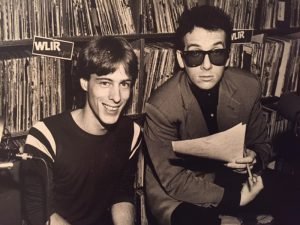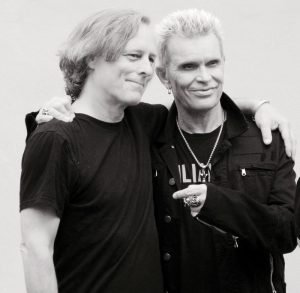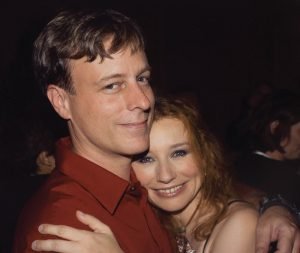+ By Brenda Wintrode + Photos by Alison Harbaugh + Fall 2018
“Do you know who Robyn Hitchcock is?” asks WRNR Program Director Bob Waugh. I don’t. I observe a flicker of disbelief, but he quickly forgives. “Google him. He’s a legendary musician in the U.K.,” he explains. Waugh realizes that not everyone can know what a 40-year veteran musicologist such as he knows.
Behind him, on the wall of his modest Annapolis radio station office, hangs one of Alabama Shakes’ gold albums and a publicity poster from the Scottish act Travis. I’m sitting in a low, red leather guest chair that puts me level with a mini-wall of CDs bordering the front edge of Waugh’s desk, in the space where a nameplate might sit if it were important to him. Waugh’s disarming presence and calm demeanor mirror the mild, composed voice that introduces a mix of familiar alternative and edgy new songs to Annapolis each weekday afternoon on 103.1 FM.
He maintains an attentive and engaging gaze, and with both elbows on the desk, sifts through the jewel cases, then handles one that has an artful, eye-popping cover. The desk pile, Waugh tells me, represents one week’s worth of listening sessions; the rows of three-foot-tall stacks lining the floor are just from this year. I wonder what that artist would think or say if she knew the man who aided the careers of Coldplay, The Clash, Radiohead, Beastie Boys, Jane’s Addiction, The Ramones, and Hozier had her CD in his hand.
In 1979, Waugh had a radio show called Off the Boat on the divergent, new wave WLIR on Long Island. The now-disbanded station’s history is enshrined in the Showtime documentary New Wave: Dare To Be Different. The Friday afternoon routine at WLIR involved Waugh racing to Kennedy Airport to retrieve the 12-inch singles imported from Europe. He would listen all weekend, judiciously deciding what to play during his Sunday slot. “I remember the first time going there and getting this band, Culture Club, and the song ‘Do You Really Want to Hurt Me,’ or Thomas Dolby’s, ‘She Blinded Me With Science,’ . . . Adam and the Ants, Siouxsie and the Banshees, The Cure, just a lot of bands that were breaking, not even breaking. I mean, nobody knew,” says Waugh. The team of WLIR DJs created a market that became the soundtrack of the 1980s.
A notable among notable discoveries from that era was the single “I Will Follow,” by a then-unknown Irish band. Waugh remembers bursting into a music meeting with U2’s first release in hand, insisting that everyone listen. It was perhaps the first of many musically inspired interruptions perpetuated by Waugh that were not to be ignored.
Sirius XM Senior Producer Patrick Ferrise worked with Waugh at WHFS in Washington, D.C., during the grunge trend of the 1990s. “When we first got the Foo Fighters cassette, [he] just flipped out. He flew into the studio while we were on the air and said, ‘Stop what you’re doing. You’ve got to listen to this.’ He knew Dave Grohl was going to be the future of rock,” says Ferrise, who also reported that Waugh led the industry nationally on bands like Counting Crows, Tori Amos, Jeff Buckley, and Matthew Sweet.
Waugh’s ears are not the only ones he trusts. He encourages everyone on his staff to field new material and recently accepted three band names from a bartender who wrote them on a napkin. He goes to shows locally, nationally, and abroad, feeding what he calls an insatiable appetite for new music. “If you asked me what the biggest thrill is in my career, I would say it’s that moment of opening up a new album, especially from an artist that you care about, and putting the vinyl down and the tone arm, back in the day, and listening to what has never been heard before,” he says.
Local bands send music into radio stations, begging a listen. In the mid-1990s, Waugh received a tape from Clarence Greenwood, whose stage name is Citizen Cope. “I listened to ‘200,000 (in Counterfeit 50 Dollar Bills),’ and as soon as that song was over, I picked up the phone and called him,” says Waugh. Greenwood went to meet Waugh at WHFS, and Waugh told him he was going to try to help further his career. “I took his music, and I started sending it out to everybody I knew in the industry. The feedback was pretty positive, but there wasn’t anybody who wanted to sign him, except for a friend of mine who worked at DreamWorks Records,” says Waugh. He and Greenwood flew to Memphis to meet the studio executive, and Greenwood went home with a record deal and a career that has lasted decades.
Waugh takes his reputation as a tastemaker in stride. “I’ve championed a lot of music that didn’t go anywhere. Then there are some [for whom] we can proudly say we were so far ahead of the curve and we totally recognized [the music] for what it was,” he says. Portugal. The Man is one such relationship for Waugh and WRNR. Over the Oregon-based band’s 14-year career, WRNR has played all of its records. Its 2017 “Feel It Still” remained at number one on Billboard’s Top Alternative Songs chart for a record-breaking 20 weeks. “They won a Grammy!” exclaims Waugh, as happy for the band’s success as he is for being there from the beginning.
 When Portugal. The Man came to Delaware in June, the band gave one interview, with WRNR. The same thing happened when Beck came to town—Waugh was granted an exclusive sit-down lasting an atypical 30 minutes. Waugh considers his interview style a craft, challenging himself to create both rapport and meaningful conversation. “Beck’s tour manager was knocking on the station room door to get us to wrap up,” he says. He considers that a high compliment.
When Portugal. The Man came to Delaware in June, the band gave one interview, with WRNR. The same thing happened when Beck came to town—Waugh was granted an exclusive sit-down lasting an atypical 30 minutes. Waugh considers his interview style a craft, challenging himself to create both rapport and meaningful conversation. “Beck’s tour manager was knocking on the station room door to get us to wrap up,” he says. He considers that a high compliment.
Waugh has a youthful presence, defied only by a head of gray-brown hair and a beard of close-trimmed white stubble. He seems to maintain a typical suburban family life outside of work—he likes to grill, garden, bird-watch, and, according to friends, always has a book. However, unlike most middle-aged suburbanites, Waugh has attended an Orioles game with Joan Jett (whom he calls Joanie), dines with industry power brokers, travels to Brooklyn, NY to catch a blossoming new act at the request of a major record company, and scores exclusive interviews with musicians that don’t really need to do radio interviews anymore.
Anecdotes about his relationships with soon-to-be or already famous musicians are best sought from his coworkers. He veers away from self-congratulatory name-dropping, stating on his resume that his references are available upon request.
WRNR Music Director Carrie Neuman shared some stories about her boss and mentor. She remembers listening to Waugh on WHFS during her youth, but not until she began working with him did she become aware of his extensive connections. “As the years went by, I heard stories from other people. He’s sat down with Bono,” says Neuman, impressed.
These relationships were earned during every decade of Waugh’s career, but the depth of his reach was publicly visible during his time as a creator, producer, and organizer of Washington, DC’s legendary HFStival—an annual, one-day, multiartist, live music festival for which Waugh secured the talent. Neuman describes the event as an industry innovation. “Where else could you see 18 bands all on one stage? The Ramones, Joan Jett, and Jewel, all playing on the same day? It was sort of unheard of at the time,” she says.
“Bob was really good friends with Joey Ramone. Not only did he call out Bob’s name and thank him on stage more than once, but he gave Bob his leather jacket,” says Neuman. Ramone, lead singer of The Ramones, was a WLIR listener and would call the station at 3 a.m., during Waugh’s shift. Waugh recollects the beginning of their relationship. “I’d be on the air, and the request line would ring. ‘Hey Bob, it’s Joey,’ and I’m like, ‘Yeah, right,’ and hung up. But he was persistent. He would make requests,” says Waugh, still in disbelief. The two eventually met and then worked together. The jacket was a thank-you for working on a project. Some years later, Waugh gave that jacket to a DJ friend experiencing dire financial distress.
Name-dropping begets dinner conversation, but according to WRNR Production Manager and morning show host Rob Timm, Waugh solidified his reputation based on substance. The pair has worked together for decades; they partnered on the WHFS morning show, and Waugh brought Timm over to WRNR. “Just because a lot of triple-A program directors may think that ‘XYZ’ is this great new record that everybody must start playing, if Bob thinks that record sucks, he’s not going to play it,” says Timm. “That stuff sometimes drives the record companies insane, but frankly, I don’t think he cares.” Waugh repudiates industry expectations without consequence because of an ample supply of credibility. “Bob maintains extremely good relationships with people on all sides. Everybody recognizes what he has is integrity,” says Timm.
“Rayland Baxter is a great example of an artist we stepped out on that not many stations played, but we didn’t care,” says Waugh. He fell in love with Baxter’s graceful harmonies and memoir-style lyricism on his 2015 album, Imaginary Man. Upon reading Baxter’s bio, Waugh discovered that the artist had graduated from Annapolis High School, barely a mile away from WRNR. “He’s really on the cusp of breaking out in a big way,” he says. This summer, Baxter was the featured artist on the July WRNR Rock ’N River Cruise. He also stopped by the station for an in-studio performance and interview. “Nobody was knocking down [his] door to play my song. He believed in me as a performer and a writer,” says Baxter.
The business of selecting WRNR’s music occurs during its Monday music meeting in Waugh’s office, where he and Neuman decide which two to four songs, or “adds,” will best enhance the weekly station playlist. They pore over sources, including industry charts and streaming and download data, studying what national markets similar to theirs are playing. They’ll listen some together at work, but are really always listening for potential new adds.
Neuman hesitantly hands Waugh a CD of her selections. “This first one is something we can wait on, maybe save it for later,” she says. One can only imagine how intimidating it is to share a new tune with Waugh. “Why wait?” he says, loading the player. The tune, by a band called Ash, is bouncy and lively, borderline pop but with an edge. Neuman watches his face. “It’s like Britpop. It’s like Arctic Monkeys, early Arctic Monkeys. The Kooks come to mind. Going back even further, it’s almost like Squeeze,” he says. The song seems to agree with him, but he wants to hear the rest before they decide. Advancing the track on the player by his desk, Waugh rubs his eyes and rests his face in his hands, anticipating the first beat of the next song he’s never heard before. █









































